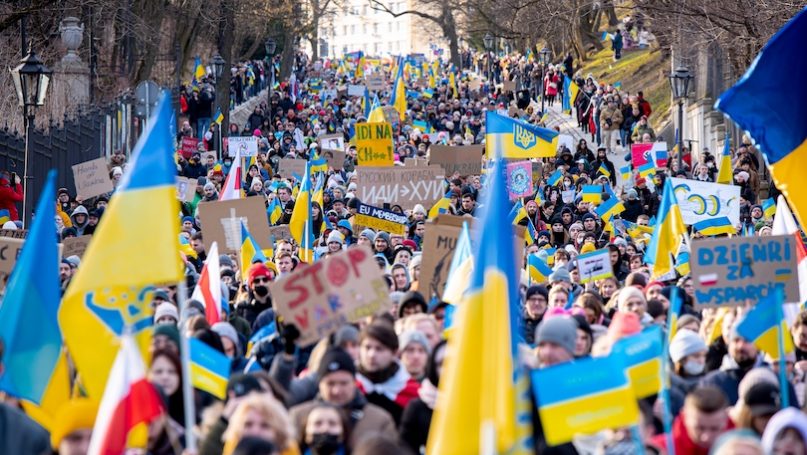
With the ongoing war in the Ukraine, international politicians and campaign organisations are continually inviting us to express support for the solidarity actions of international civil society. International civil society is increasingly seen to be key in pressurising the Russian regime and mobilizing public opinion behind the defence of the Ukraine. Who wouldn’t want to be part of international civil society? Who wouldn’t want to take the opportunity to show that they belong to international civil society, even to show that they take their membership responsibilities seriously? Against this growing moral consensus, it is important to flag up the unpleasant paradox at the heart of international civil society. The paradox is that international civil society is in essence neither particularly international nor inclusive, nor particularly civil and peace-loving, but rather works upon divisive moral binaries which can easily become highly racializing and dangerously militaristic.
Firstly, ‘international civil society’ is not very international. Whilst the rhetoric of solidarity with the Ukraine is couched in universalizing terms of ‘global’, ‘world-wide’ or ‘international’ moral outrage, the states of the Global South have been notably absent from moral grandstanding. This has led some commentators to suggest the possibility of a new non-aligned movement, which rejects the Western demands of war and rearmament for ‘peace’.
However, the problem of ‘international civil society’ rhetoric is not merely that it is exclusive and selective on a factual level. It is deeply divisive because ‘international civil society’ can only come into existence on the basis of a moral binary which provides its ethical identity. If there is no construction of an existential threat there is no international civil society. Thus, the demand for solidarity with ‘international civil society’ is necessarily morally divisive. It is necessarily against someone or something morally to be excluded, as not just ‘uncivil’ but an entity that in its ‘uncivility’ is a threat or an offense to ‘international civil society’.
The performance or construction of ‘international civil society’ thereby is indistinguishable from demands for denouncing/ sanctioning/ cancelling/ withdrawing from/ banning/ whoever is constructed as a threat to or ‘outside’ international civil society. Because ‘international civil society’ is constructed as a moral or ethical identity, the binary division easily becomes a totalizing one. There can be no grey areas, no room for ambiguity. Paradoxically this not only makes ‘international civil society’ lacking in its very internationalism, in terms of its need for division and exclusion, it is also not very civil. There is very little protection afforded those on the wrong side of the moral divide, while those with the moral high ground have little to constrain them.
To illustrate the second paradox, the lack of civility, a good example of what happens when you end up on the wrong side of ‘international civil society’ has been the media and institutional treatment of the Russian gymnast Ivan Kuliak who attached a ‘Z’ symbol to his leotard, at a recent World Cup event, showing support for the Russian forces. He is alleged to have ‘provoked global anger’; the International Gymnastics Federation immediately condemned his “shocking behaviour” and he now faces the prospect of losing his medal and a lengthy ban from the sport.
Of course, international civil society is not all about bans and restrictions on free speech. Hate speech restrictions are being lifted to allow Facebook and Instagram users in Eastern Europe and the Caucasus to call for the deaths of Russians and Russian soldiers. The parent company of Facebook and Instagram, Meta, is also to allow praise of the Ukrainian far-right Azov battalion, which is normally prohibited. A spokesperson stating the company was “for the time being, making a narrow exception for praise of the Azov regiment strictly in the context of defending Ukraine, or in their role as part of the Ukraine National Guard”.
Of course, we have been here before, when ‘international civil society’ was regularly relied upon to legitimise taking sides in another conflict on Europe’s margins, during the late 90’s and the wars of Yugoslavia’s disintegration. Here, too, there was international moral outrage, embedded media reporting bringing the horrors of war into every living room and the illegal bombing of European capital cities. Perhaps the lesson to be learned is that US and European-led ‘international civil society’ easily went from moral outrage calling for humanitarian aid for besieged European capital Sarajevo to support for the ‘illegal but legitimate’ bombing of European capital Belgrade.
We should say no to international civil society because totalizing moral binaries are particularly dangerous in the sphere of international relations, where international law lacks universal mechanisms of enforcement. Readers might think it’s unproblematic to implement selective rules for political symbolism in sports or for hate speech on social media depending on what side of the moral divide of ‘international civil society’ individuals are on. However, it is clear that moralizing the international order, in the ‘paradigm shift’ called for by UK Foreign Secretary Liz Truss, can only further cohere existing international inequalities and postcolonial hierarchies.
Further Reading on E-International Relations
- Opinion – The Myth of Being Anti-Racist and Anti-War in the Ukraine Conflict
- Opinion – Political Positionality and the War in the Ukraine
- Opinion – The Russian Invasion of Ukraine: Between Solidarity and Whataboutism
- Opinion – A Hidden Victory? The Winter War and Russia’s Invasion of Ukraine
- Opinion – On and Beyond Whataboutism in the Russia-Ukraine War
- Opinion – Reducing Nuclear Fears to Negotiate a Winning Peace in Ukraine